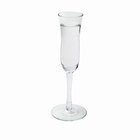
When it comes to high-proof spirits like vodka, the definition of "old" is relative. While some vodkas can last for decades after being opened, others come with recommended expiration dates. This generally comes down to the vodka's alcohol by volume (ABV), as high-proof spirits last longer than their less-alcoholic counterparts. If your bottle doesn't have an expiration date, its ABV can help you determine whether it's safe to drink.
Full-Proof Spirits
Spirits considered "full proof" generally don't expire. These are spirits that are at least 80 proof, which include most types of gin, bourbon, rum and vodka, among others. Eighty proof spirits contain 40 percent alcohol, which is a high enough alcohol content to prevent the spirit from spoiling over time -- even after it's been opened. Any changes to the flavor profile will be negligible, especially if the vodka is used as an ingredient in a mixed drink.
Freezing Your Vodka
While other beverages need to be frozen or refrigerated, vodka can stay on your shelf. Its high alcohol content prevents it from freezing, so while you can store it in the freezer for a few hours to chill it before a party, the spirit itself retains its liquid state. This is perfectly suited to short-term chilling, but storing your vodka in the freezer long-term can actually do more harm than good. Subjecting this spirit to frigid temperatures for prolonged periods of time can actually cause it to break down, making it lose some of its intended aroma and flavor. If you want to keep your vodka chilled and ready at all times, it should be kept between 41 and 44 degrees Fahrenheit.
Low-Proof Vodkas
Eighty proof is the standard for most plain vodkas, but flavored vodkas behave a little differently. Flavored vodkas are made with extra sugar and other ingredients that can lower the proof; many flavored vodkas are 70 proof, a small change in alcohol that can make the difference between an indefinite shelf life and spoilage. These vodkas can be frozen, and will go bad over time.
Checking the Expiration
If you aren't sure whether your vodka is safe to drink, the most important thing you can do is check the bottle for an expiration date. Generally, the manufacturer will include an expiration date printed on the bottle, usually on the bottom. This is particularly true for flavored and lower-proof vodkas, which have shelf lives shorter than higher-proof formulas. If your vodka doesn't have an expiration date or it's 80 proof or higher, it's safe to drink.
Related Articles

How Long Can a Bottle of Vodka Last ...

What Is the Highest Proof Vodka?

Does Brandy Freeze?

Does a Chilled Champagne Bottle Need to ...

How Long Should a Wine Collector Keep a ...
How Long Can You Keep an Open Bottle of ...

Will Vodka Go Bad if It Is Left in the ...

How Long Does Liquor Keep in Storage?

Does Limoncello Liqueur Need to Be ...

The Danger of Storing Hard Cider in ...

What Alcohol Can I Drink on a Gluten ...

How to Store Cognac

Why Does Wine Not Expire?

What Can You Mix With Blended Scotch?

How to Pasteurize Homemade Wine
Does Lemon Juice Go Bad If Not ...

How to Make Vodka Jelly
How Long Can You Refrigerate Fresh ...

Different Kinds of Margaritas

How Long Will Plastic Bottles of Soda ...
References
Writer Bio
Tom Ryan is a freelance writer, editor and English tutor. He graduated from the University of Pittsburgh with a degree in English writing, and has also worked as an arts and entertainment reporter with "The Pitt News" and a public relations and advertising copywriter with the Carnegie Library of Pittsburgh.
Photo Credits
Jupiterimages/Stockbyte/Getty Images